After a child joins your family, you naturally expect lots of changes. From your sleeping habits to what you take along with you on an outing, while you learn firsthand how to raise a child. Another aspect that new parents may wonder about is how the relationship with your partner might change once the big day arrives. Including changes in your sex life.

Moms know the physical act of childbirth can bring about big changes both mentally and physically. And newfound parenthood can weave a number of challenges into relationships. Even after some time goes by and couples develop a new "normal," there are loads of factors that can impact the opportunity for intimacy. Including fatigue, feeling " touched out," and kids who may be peeping at you when you're trying to get it on. We surveyed 977 parents to see how their sex lives changed after they added to their families.
For Better or For Worse
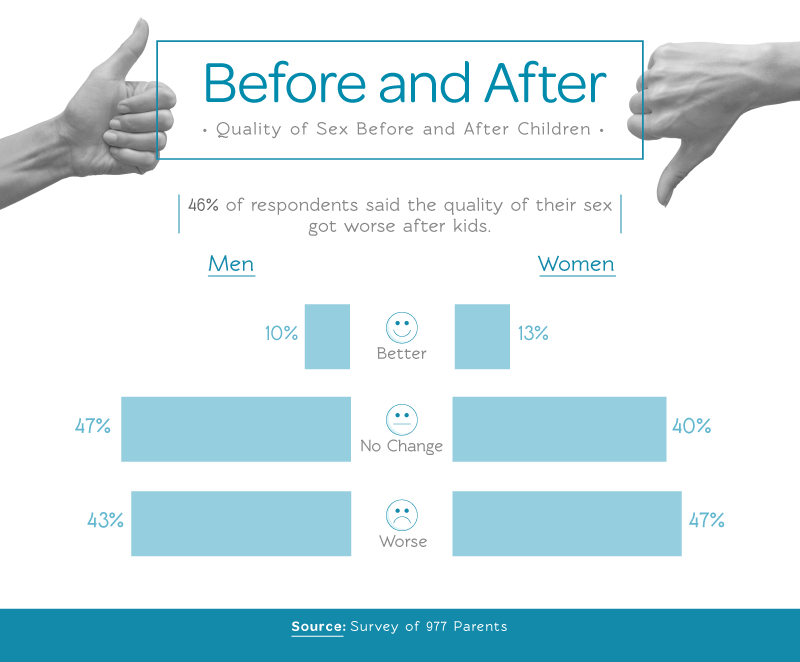
We initially asked parents to compare the overall quality of their sex life before and after they had kids. Overall, 46 percent of respondents said the quality of intercourse got worse after having a child. For women, 47 percent admitted the quality of intimacy decreased, whereas 47 percent of men said it stayed about the same. This could be due to numerous factors, including the fact that a new baby can wreak havoc on our beloved sleep schedules.
And also sever our free time for romance tragically short, both of which can keep anyone's libido down. There was, however, a small percentage of both men and women who claimed sex was even better after having a child. But, more so, it was either the same as or worse than before the baby came along.
Changes All Around
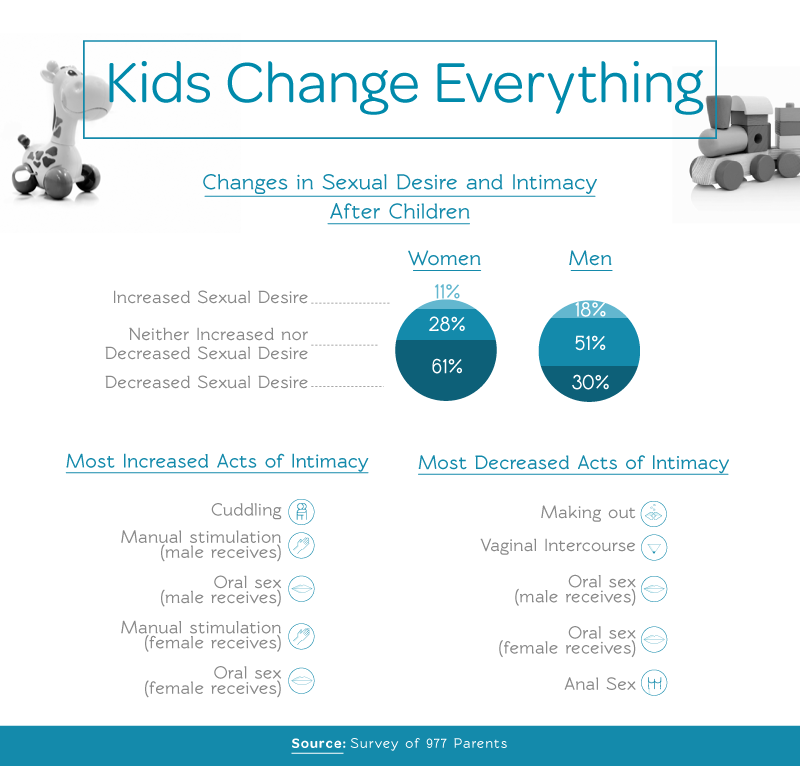
We took these answers a step further to see if there was more to the story and, of course, there was. We started off looking to see if there was a difference between men and women when it comes to parental sex lives, and it was apparent that post-baby women have a greater decrease in their sex drive than men.
61 percent of women said they wanted less sex after kids, while only 30 percent of men felt the same way. One aspect may be the differing biology between the sexes, as women are wired to develop a strong bond with their kids, which comes by way of the "love" hormone oxytocin, and taking care of a small child can satisfy a woman's need for attachment and closeness.
However, this is only one small part of the issue, as having a baby is an enormous life change for moms. New parenthood can be overwhelming and exhausting and can relegate amour to the back burner.
Additionally, we queried on specific acts of intimacy to see which became more frequent and which seemed to fall by the wayside. Cuddling became more frequent for our respondents, who noted an increase in snuggling, while making out became far less frequent after parenthood. Vaginal intercourse was also notably reduced in frequency post-childbirth.
Happy Couples?
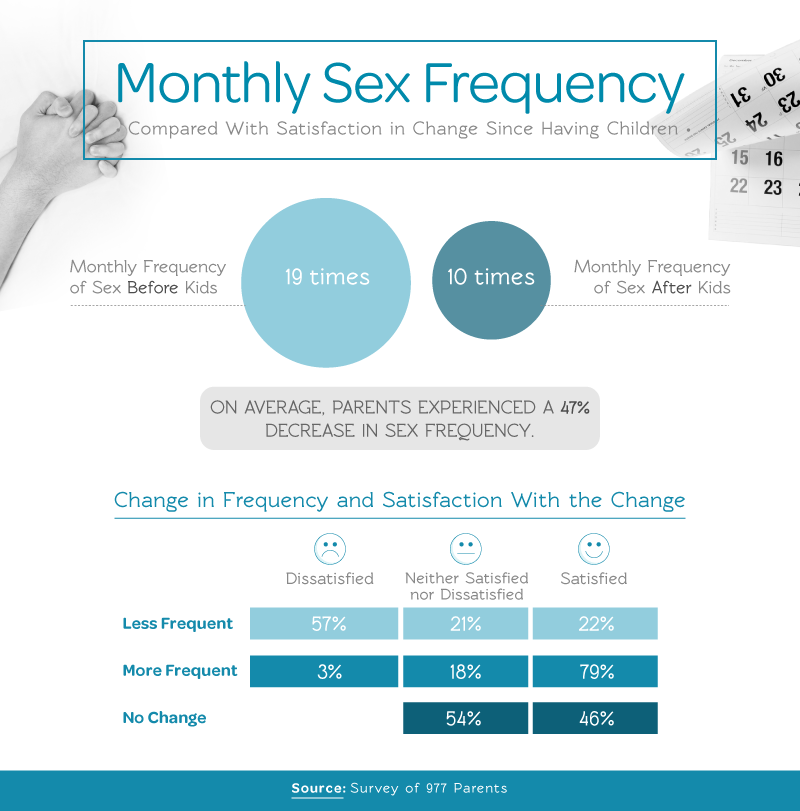
While the frequency of intimacy changes after kiddos arrive, not everyone is completely displeased with this fact. Let's talk overall numbers first: According to our survey, parents had sex an average of 19 times per month before they had kids, which dropped to an average of 10 after their families grew. This means how often parents had sex after kids was nearly cut in half.
While 57 percent of parents were dissatisfied with less frequent romps, 21 percent were neutral on the topic, and 22 percent said they were more satisfied. There were also couples who reported a greater frequency of sex after they had kids, and while 3 percent weren't cool with that, 18 percent were neutral, and 79 percent were pretty happy with how things progressed post-birth.
Other moms and dads found that there was no change in frequency. While just over half were pretty neutral (neither satisfied nor dissatisfied), 46 percent were happy with the status quo and that things stayed the same.
Making Time
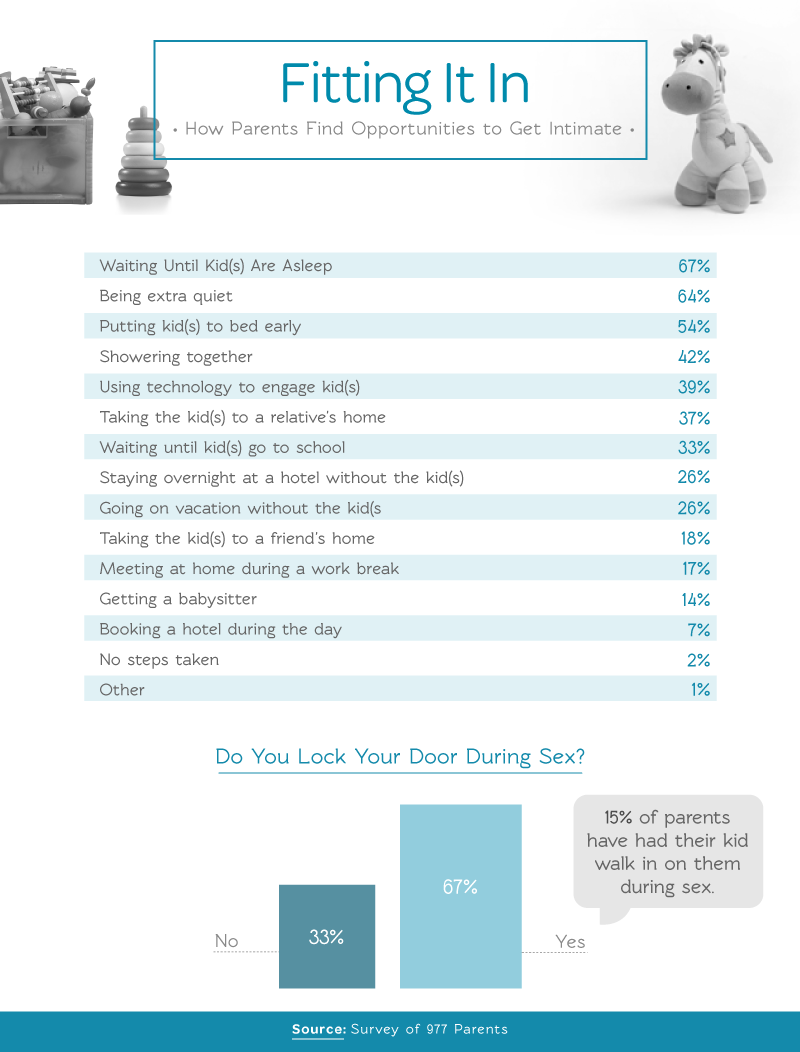
One challenge parents encounter after they have kids is how to find the time to get intimate. While a solid 67 percent of folks just wait for their child's regular bedtime, other parents got creative. A full 64 percent got busy, but were "extra quiet," while 54 percent put the kids to bed early (because, let's face it, being a parent can be stressful and tiring, and once the kids go to bed, many moms and dads just want to sleep).
While some parents showered together to get some extra intimacy in their lives (42 percent), another 39 percent reported that they distracted the kids with movies, games, or other technology to get some alone time.
There were more extreme (and costly) examples given as well: More than a quarter said they'd booked a hotel room overnight (sans kids), and another quarter said they'd gone on vacation without their kids to pursue intimacy.
Others dropped the kids off at a friend's house to play (18 percent), while 14 percent booked a sitter (another option that costs some money). Interestingly, 2 percent of parents said they didn't bother taking extra precautions.
For those brave enough to spark intimacy while their child was awake, 15 percent reported having a little one walk in on them having sex. While this can be a stressful moment, experts suggest collecting your thoughts and explaining things in an age-appropriate way instead of screaming at them to get out, which might scare them and make them think something bad is happening.
Making it Happen
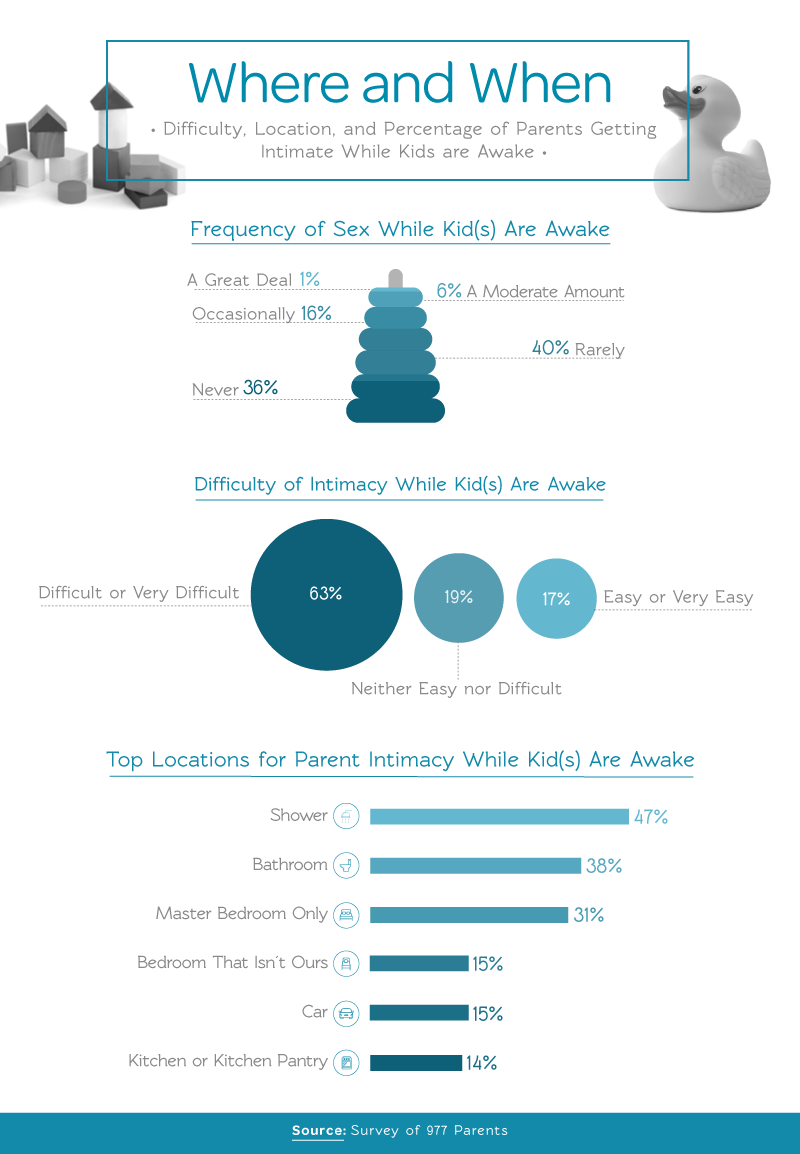
Another factor parents find themselves contending with is where and when to be intimate. Thirty-six percent of our respondents reported they never got intimate when their child was awake, and another 40 percent said they rarely did.
Some parents (16 percent) noted that they occasionally had sex when their kids were up, 6 percent said they did so a moderate amount, and 1 percent said they did it very often while the kids were awake.
On that note, only 17 percent said it's either easy or very easy to accomplish this task with kids around (perhaps they are the ones who distracted their kids with tablets), but 63 percent said that sex when kids were awake in the house was difficult or very difficult.
This is probably why there are so many creative strategies listed above. And why parents of infants might have a harder time sneaking away when their baby is awake. Versus the parents of kindergartners who can be more easily (and safely) distracted with their favorite TV show or app.
As far as places around the house, most parents (47 percent) reported that the shower was their top place to get busy, while 38 percent said the bathroom in general was a prime destination for sex. However, 31 percent said they don't leave their bedroom to get intimate, while 15 percent said "someone else's bedroom" (at least there is still a mattress), and another 15 percent laid claim to the car.
Conclusion
Sex after parenthood typically does not come to a screeching halt unless there is another underlying issue. However, most parents report that intimacy does change after they become parents, likely due to logistics and the changing roles they take on as they navigate parenthood with their partner.
While your sex life may be a little different now that you've expanded your family, and you may be more likely to want to catch up on sleep instead of have sex when you turn in each night, a new mattress might be on the horizon to help guarantee a good night's rest.
For those of you who are looking for a mattress upgrade to go along with your new routine, we'd like you to know that every Leesa Mattress is custom made to order – our mattresses are never sitting in a warehouse or damp storage space gathering dust and mold or lingering on a retail shelf somewhere. They are designed, built, and wrapped just for you. So even if you're getting intimate less often, the comfort of our mattresses will make your bedtime romps that much more satisfying.
Methodology
Using Amazon's Mechanical Turk Service, we surveyed 977 parents on how their sex lives have changed since having a child. We focused on parents who were still living with the biological parent of their firstborn child who also lived at home and was aged 18 or younger. For parents with more than one child, we asked them to answer questions in relation to their firstborn child only.
The average age of respondents was 36.4 with a standard deviation of 7.6, and the ages ranged from 19 to 78 years old. Our respondents were 42 percent male and 58 percent female.
For questions regarding intimate acts, things parents do to make time to get intimate.
And different places they get intimate, respondents were presented with a preset list of options with the opportunity to write in additional responses. Preset responses for these questions were curated from existing articles and asking Redditors their thoughts on the questions.
For quality of sex questions, respondents were presented with the following options:
- Extremely bad
- Bad
- Somewhat bad
- Neither good nor bad
- Somewhat good
- Good
- Extremely good
To determine if sex quality was better or worse, we took the quality option selected for ‘before kids,' and if it was higher or lower on the list, it was considered worse or better, respectively.
For example, anyone who selected "Extremely good" before children, and selected "somewhat good" after children would be categorized as "worse." While still considered good overall, the quality experienced a decrease.
For the data related to difficulty of finding time to get intimate, respondents were again presented with a scale:
- Very difficult
- Difficult
- Neither easy nor difficult
- Easy
- Very easy
The two difficult options were combined to just be labeled as "difficult" in this project, as well as the two easy options combined to just be labeled "easy."
All of the data found in this project rely on self-reporting. There are some limitations with self-reporting, such as under- or overestimating, selective memories, and other limitations not listed.
These data are not weighted, nor were they statistically tested; therefore, they should not be treated as such.
Fair Use Statement
The content found in this study is available for noncommercial reuse. We ask that when sharing this content, please include a link back to the author and this study so that people can explore the full project and its methodology.



